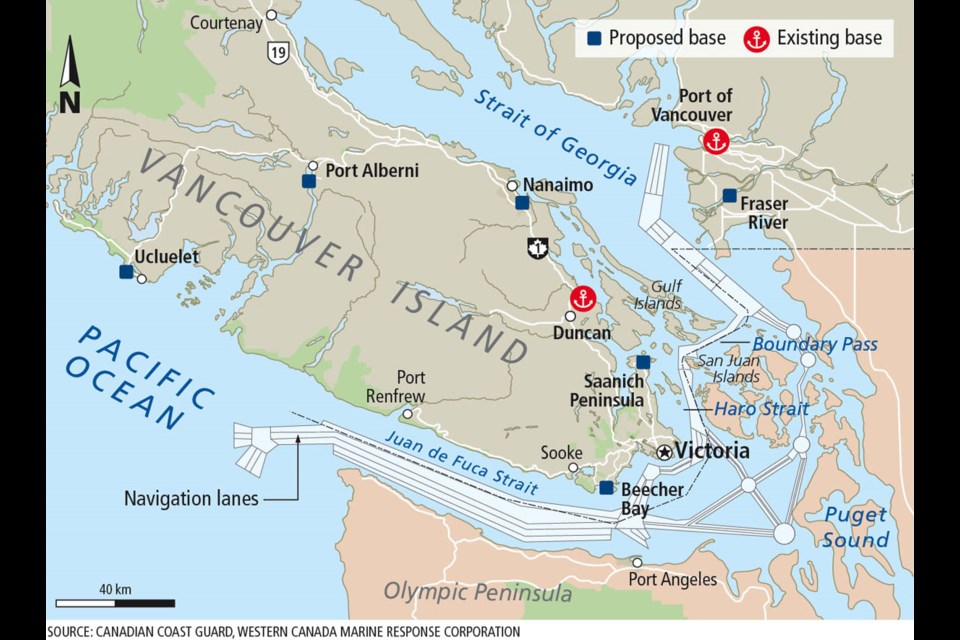While opposition to Kinder Morgan’s Trans Mountain pipeline expansion project is widespread on Vancouver Island, some communities are looking forward to promised new oil spill response bases.
Industry-funded Western Canada Marine Response Corporation is ready to put shovels in the ground on five bases in Nanaimo, Port Alberni, Ucluelet, Sidney and Beecher Bay.
The plans are awaiting provincial approval for Trans Mountain as well as Kinder Morgan’s final investment decision, expected between January and March.
“Once that decision is made, it will be quite quick,” Western Canada Marine Response Corporation spokesman Michael Lowry said. “We need to be fully up and operational about six months before the pipeline is in operation, so our timeline is even more condensed than theirs.”
The new bases are part of an expansion that includes $200 million in enhancements, 115 new employees and 26 new vessels.
Nanaimo will host the hub base for Vancouver Island, which will include an Island administrative and dispatch centre. It will be home for a 5,000-tonne, 285-foot barge and a 78-foot boom vessel, as well as landing craft and workboats. The base will be responsible for rapid response for east Vancouver Island and include equipment storage for 36-hour response. It will employ 22 people. Completion is estimated by early 2018.
Initial rapid response for the western Island will involve Port Alberni and Ucluelet satellite bases. They will have the same vessels as Nanaimo, plus a 78-foot skimming vessel. They will have 17 personnel, and completion is anticipated for early 2018.
Sidney will have a satellite base equipped to respond to southeastern Vancouver Island, including Haro Strait and Boundary Pass. It will have a 65-foot skimming vessel, landing craft and workboats, and employ 22 people. Completion is anticipated between April and June 2018.
Beecher Bay will host another satellite base, equipped for rapid response for southern Vancouver Island and Juan de Fuca Strait. It will have a 78-foot skimming vessel, 78-foot boom vessel, landing craft and workboats. Beecher Bay will be staffed by 15 people and completion is anticipated between April and June 2018.
Western Canada Marine Response Corporation already has operational spill-response bases in Duncan and Vancouver Harbour.
The new bases are separate from the federal government’s $1.5-billion ocean protection plan, which preceded its approval of the Trans Mountain project in November.
Port Alberni Mayor Mike Ruttan said his community is looking forward to the new base, which will feature an interpretive centre where the public can view equipment.
It could help boost tourism and be a destination for school trips in the community, he said.
Although Ruttan said he would prefer not to see an increase in tanker traffic, the spill-response facilities would be a silver lining.
“We don’t ever want to think there is going to be a marine disaster that involves an oil spill. And we also don’t like the idea that we’re using this resource that, in the end, creates problems for our atmosphere.
“But having said that, the reality is that we do use it and we do need it and we do export this stuff. And we have for 60 years from Burrard Inlet,” Ruttan said.
Right now, the community has a robust volunteer search-and-rescue team that uses equipment donated by the Canadian Coast Guard and purchased through community efforts.
But it’s not equipped for a major spill, he said.
Sidney Mayor Steve Price told the National Energy Board that spill response had to be improved, if tanker traffic increased as part of Trans Mountain’s expansion.
“We already have tankers out in the straits. But what we don’t have is the ability to respond in an emergency to a disaster. We have no way of cleaning it up,” Price said.
Price said Sidney is a good place for a facility because it hosts an international ferry terminal and is also near the B.C. Ferries terminal and Victoria International Airport, for quick transport of people and equipment.
“Sidney is perfectly located to cover a wide swath of the Gulf Islands and the strait,” he said.



